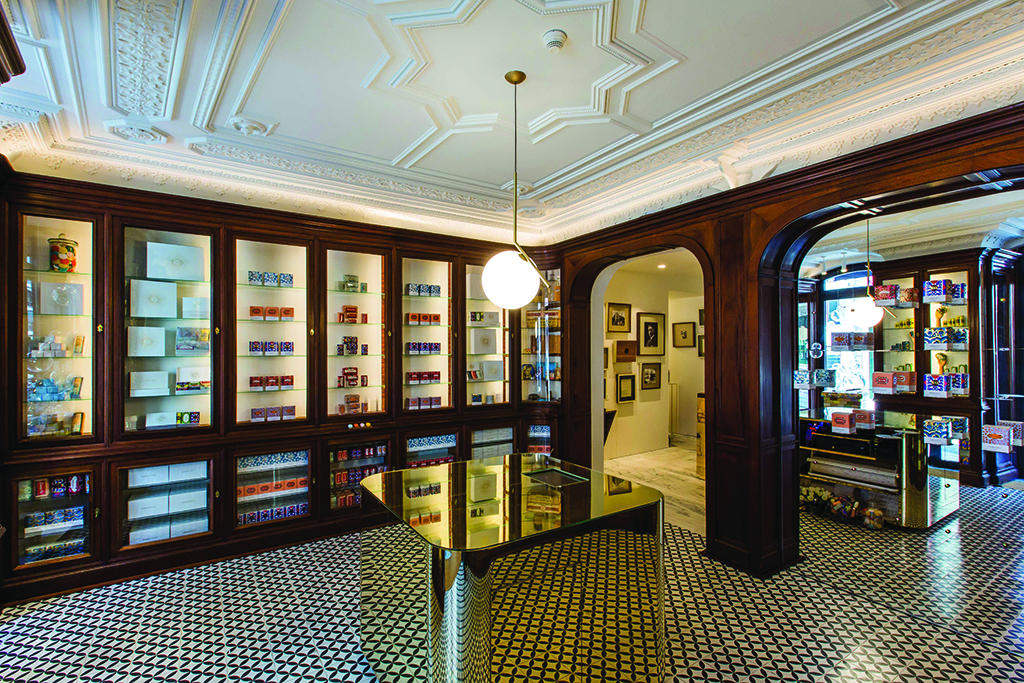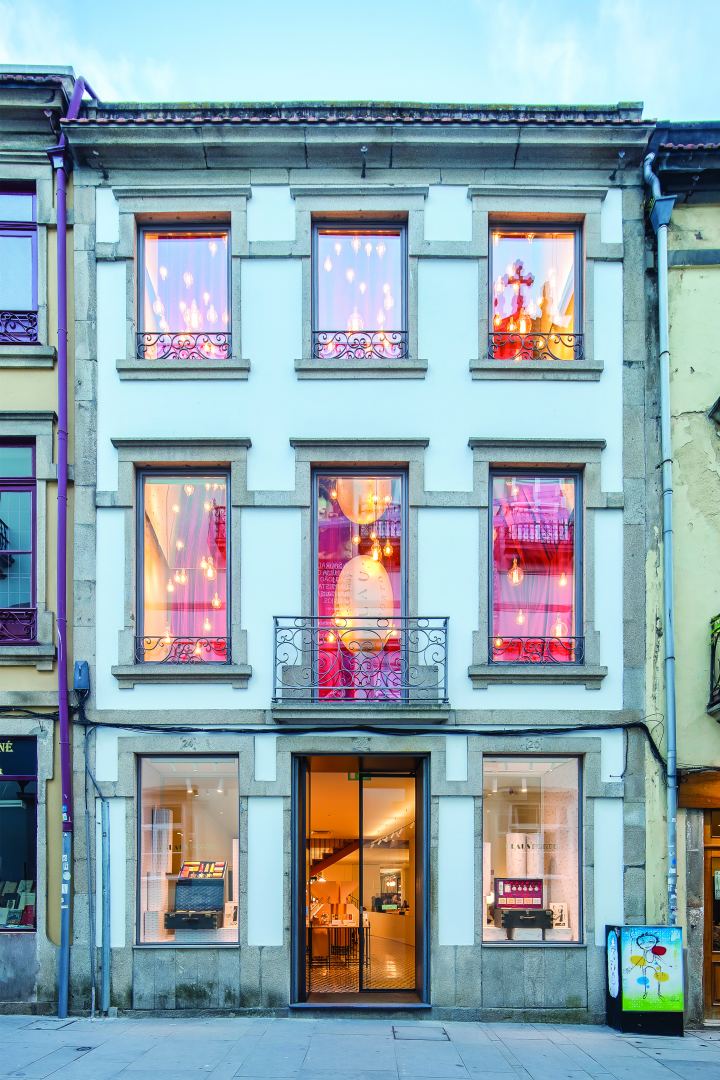A new era: Claus Porto shakes up sales of its art deco gems
Think of Claus Porto and you are immediately transported back in time to the Belle Époque elegance of the late 19th century and the clean Art Deco lines of the Roaring Twenties and Thrifty Thirties. But there’s nothing old-fashioned about Claus Porto.
Claus Porto’s marketing and business strategy is going back to basics and capitalising on a tradition and past ‘made in Portugal’.
The soaps, with their nostalgic printed packaging and fresh-smelling masculine colognes, conjure up images of fedoras and homburgs, flappers and bobbed hair styles, Duesenburg Model J cars and Hollywood stars of the silver screen.
“The company went through a crisis in the 1990s,” admits Maria João Nogueira Mendes, PR and Communication Manager for Ach. Brito, which owns the Claus and Ach.Brito brands.
“From the 1980s through to the 1990s, the floodgates opened to soaps, fragrances, creams and cosmetics from other European Union countries after Portugal’s entry in 1986. We were up against quality, mass-produced foreign products sold in new supermarkets and shopping galleries. At the time, the Portuguese believed that if something came from abroad, it was bound to be better. They no longer wanted to know about ‘made in Portugal’.”
The company, whose Porto roots go back to 1887, had to act quickly to survive. Instead of focusing inwards, as it had during the First Republic and Salazar periods, it looked overseas for its success and it still does today.
With a €7 million turnover and considerable sales in the United States, China and the United Kingdom, Claus products are sold in 50 countries in some of the finest specialist and concept shops as well as famous stores like Neiman Marcus and Bergdorf Goodman in New York, Harrods in London, Bon Marché and Marie Antoinette’s in Paris. And with a €5 million expansion strategy, they would like to open their own stores in New York, London, Paris and Tokyo.
“We like to highlight our niche luxury brand status. You can see it in the packaging, the perfume essences we use and the exclusive upmarket sales outlets where our brands are sold,” says CEO Francisco Neto.
In 2015, despite business being brisk, the de Brito family heir, Aquiles, knew that if he wanted to expand the business and brands, capital investment was needed. The result was that the majority capital of Ach. Brito, and its three brands Confiança, Ach.Brito and Claus, was sold to a Portuguese investment and risk company, Menlo Capital, which, through its SC1 Fund, provides investment that will allow the company to uptick its sales, expand it, attract new clients and channels, create a retail and online concept, and support its international expansion programme.
“The decision was a painful one, but it was important. The fund made the company more disciplined. It went from a limited company to an anonymous one. I always thought the brand had huge potential, could be run in a different way and expand more,” says Aquiles de Brito who in 2015 became the number two minority shareholding partner and non- executive director.
“I hope it will serve as an example to other family companies fearing change. Normally, funds come in when a company is struggling, but we were doing well and needed investment to expand,” says de Brito who was only 22 when he took the company’s reins. Aquiles de Brito never imagined being in front of Ach. Brito. He didn’t know what he wanted to do at the time, when his uncle asked him what he intended doing with the minority share he had inherited from his father at the age of 10. He has admitted that despite going to the factory to visit his grand- father as a child, he knew nothing of the business.
“I thought about it for a few as if a few days was enough for such a momentous decision – gathered some opinions and went for it,” he said at the time.
130 YEARS OF HISTORY
At the end of the 19th century, Ferdinand Claus and Georges Schweder, two German entrepreneurs, set up the soap and fragrance factory in Portugal’s historic town of Porto.
We don’t know exactly why they chose Portugal, or even Porto, as we no longer have documentary evidence, but we can surmise that its location near the coast and its port made it ideal to ship the luxury products to the main European markets,” says Marta Marcelo, Training Manager at Claus Porto.

Claus Porto’s store in Lisbon
“By doing so, they helped democratise beauty products in Portugal, which prior to this had only been accessible to the country’s wealthy few.” Claus and Schweder’s products’ intriguing scents and decorative packaging designs, which drew on the Belle Époque and Art Nouveau era, soon gained a loyal following. “The wording on the packaging was in French then, which shows that it was intended primarily for export,” adds Marcelo.
“The Paris World Fair (Exposition Universelle) in 1900 and the United States’ St. Louis World’s Fair (The Louisiana Purchase Exposition) in 1904 really put us on the map with several international prizes,” she adds. In 1903, George Schweder stepped down from the company and 24-year-old accountant Achilles de Brito took on an increasing role in the company. Willie Thessen, a German perfumist and chemist, joined Claus & Schweder as technical director while in 1908 King Manuel II visited the company. With the advent of World War I, German citizens were unwelcome in Portugal and the German owners were expelled. The company and the factory were nationalised.
In 1918, regardless of the uncertainty over the Claus & Schweder brand, Achilles de Brito saw potential in the business, and he and his brother Affonso formed a new company Ach. Brito. Soon, their beauty and bathing products captured the imagination of the Portuguese public with a range of soaps featuring colourful and flamboyant packaging that Brito had championed at Claus & Schweder.
They bought the assets, including the Claus & Schweder brand, factory and machinery in 1924. But it was in the 1930s that Claus Porto started to gain recognition on a global scale. More awards followed in Porto, Lisbon and Madrid while the company took part in the first Portuguese Colonial Exhibition in 1934 in Porto.
“My grandmother told me the story of a visit to the park in Porto as a little girl and seeing a man on stilts giving out little Ach.Brito soaps that year. That must have been an impressive piece of early marketing as she never forgot it and told me that story when I was growing up in the 1970s,” explains Marta Marcelo, who says that, even today, customers come into the flagship shop in Rua das Flores, Porto and get visibly emotional when they smell the scents, particularly the Musgo Real range which evokes memories of their grandparents.
“It’s a great honour and responsibility to manage a company with such a history. Our job consists of making this heritage take on a new dimension and create a new era for the brand,” adds CEO Francisco Neto.

Claus Porto’s store in Porto
One of the new marketing strategies was to sign up British perfume designer Lyn Harris to produce a limited edition unisex scent to celebrate Claus Porto’s founding in 1887. Inspired by Portuguese scents, herbs and oils, the result is Claus Porto Eau de Parfum which was launched at the Paris Perfume Museum. The brand’s perfumer, Harris, also reformulated the scents of a series of products in the Deco collection (candles, hand creams, liquid soaps, body moisturisers and scented room diffusers).
Only 1,887 Art Deco-inspired bottles of perfume designed by Alcobaça craftsman José Dias have been produced at the Ach. Brito factory in Vila do Conde, which has upped its workforce from 60 to over 100 to meet growing overseas demand driving 40% of sales. Already a fan of the brand, Harris, who established her first fragrance house Miller Harris in 2000 with partner Christophe Michel, with her scents sold in Selfridges and 60 stockists internationally, travelled through Portugal to draw inspiration for the new perfume which has citrus, fig and cedar wood notes.
“This new perfume represents a break across Portugal and the discovery of its treasures,” she says. If in the past the brands were favoured by the last Portuguese king Manuel I, aviator Sacadura Cabral, historian and geographer Gago Coutinho and President of the Republic Américo Thomaz, then today celebrity fans are more likely to appear in film and television and include Nicholas Cage, Johnny Depp and Kate Moss.
When Oprah Winfrey mentioned the products on her show, online sales sky- rocketed, and soaps were sold out in the United States. The opening of the Claus Porto Flagship Store in Porto has brought the brand full circle 130 years after the company was founded. The opening symbolises Claus Porto’s return to the centre of the city and closes the first phase in this new era of the brand’s history. But as the company begins its new phase with Portuguese private equity firm Menlo Capital, the founding family keeps a close eye on its heritage to ensure the brand continues the history and tradition, quality ingredients, the historic artwork on its packaging and unique qualities that have made this singular brand a success overseas and a household name at home.









